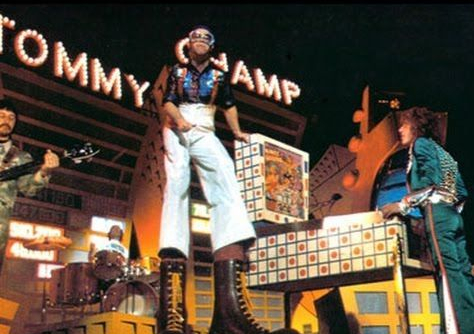The unalloyed delight in dropping into “Tommy” 45 years after it cinemas is hearing and seeing Jack Nicholson sing (respectably on key) and vamp his way through “Go to the Mirror!”
Only Ken Russell (“The Music Lovers,” “Altered States,” “Lair of the White Worm”) could pull off that coup.
The “rock opera” that surrounds it? It’s as lurid, weird, dated and prophetic as the day it came out.
The highlights for young film/Who/rock fans way back when, clinging to the familiar in an obscure, allegorical and trippy musicals, aren’t the treat they were in 1975.
Tina Turner‘s “Acid Queen” pulls out all the stops, and then some — WAY over the top. Elton John as The Pinball Wizard, the second, third or fourth choice for the role (depending on who you read) that produced the movie’s hit single is so confined by the platform boots/stilts of his costume that he becomes a still-life.
The “story” is murky enough to allow for interpretations that don’t match creator Pete Townsend’s intent. The precipitating incident, for instance, young Tommy’s WWII bomb pilot dad’s “death” at the hands of his mother (Ann-Margret, all-in) and Mom’s replacement (Oliver Reed) for five-years-dead Dad (Robert Powell), works better as a metaphor than a literal murder.
I mean we’ve seen the plane go down, seen no warning that he’s been alive but badly-burned for years and years, Tommy sees him in his sleep then stumbles across him being “killed” by Frank (Reed) and Mum? Metaphor. Tommy could still be rendered “deaf, dumb and blind” by the double trauma without a literal murder.
So much of the rest of the movie is already allegorical, most prophetically The Preacher. Russell cast Eric Clapton — of the “Clapton is God” graffiti of the day (late ’60s, when Townsend composed the two-LP opera) — as The Preacher, guitar slinging leader of the Cult of Celebrity (Marilyn Monroe, specifically).
Tommy’s (Who lead singer Daltrey) walled-off-from-the-world soul finds his one means of expression, pinball in that pre-video game era.
His image and fame are exploited by Frank (Reed has a couple of songs, and hits no recognizable note in any of them), a veritable Mama Kardashian of his day, as Tommy’s Mom suffers, clings to her boy and spirals into addiction.
Russell, a filmmaker who became famous for his excesses concurrent with the making of “Tommy,” wallows in them throughout — vibrant (’60s) colors, Ann-Margret’s character rolling around in chocolate and baked beans mid-breakdown, spectacles great and small cataloguing British history from The War through the ’50s, into the ’70s marching cultishly towards 1984.

The film, like the album on which it is based (and which became a more coherent (well, somewhat) Broadway musical in the ’90s, earned brownie points for its ambition at the time. Not many loved it, but a few appreciated it.
Now, as eye-popping as it remains, as charmingly wretched in its excesses, it feels quaint — like a snapshot of the ’60s taken with ’70s technology viewed nostalgically from the Reagan/Thatcher era.
They don’t make’em like this any more. And the only person to let Jack Nicholson sing since was Nora Ephron in “Something’s Got to Give.” More’s the pity.

MPAA Rating: PG, drug content
Cast: Ann-Margret, Oliver Reed, Roger Daltrey, Tina Turner, Elton John, Eric Clapton, John Nicholson, Keith Moon, Pete Townsend, John Entwistle
Credits: Directed by Ken Russell, script by Ken Russell and The Who.
Running time: 1:51



